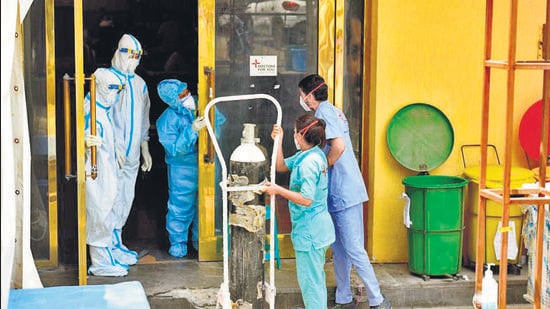Drug resistance to fungal infections increasing: ICMR report
The findings reinforce concerns around the overuse of antimicrobials and found that one of the pathogen that showed increased drug resistance in the study is also one that causes secondary infection in many serious Covid-19 cases.
There has been a sustained increase in drug-resistant pathogens, according to the latest annual report of the Antimicrobial Resistance Research and Surveillance Network released on Friday, which surveys infections in large hospitals, and has found an increase in the number of cases that were hard to treat with currently used antimicrobials.

The findings reinforce concerns around the overuse of antimicrobials and found that one of the pathogen that showed increased drug resistance in the study is also one that causes secondary infection in many serious Covid-19 cases.
The pathogens include klebsiella pneumoniae (that causes pneumonia) and acinetobacter baumannii (that cause pneumonia, urinary tract infection) -- these are usually found at tertiary care hospitals.
The study, however, also highlighted a slight recovery in susceptibility of one of the most commonly found pathogens -- E Coli -- to Imipenem, one of the broad-spectrum antibiotic drugs (that act against wide range of disease-causing pathogens), from 63% in 2019 to 72% in 2020.
“This is only a slight recovery and that too for one antimicrobial. On the other hand, we also have pathogens such as acinetobacter baumannii and klebsiella pneumoniae in which drug resistance has been increasing. This is especially concerning because K pneumoniae is the commonest pathogen causing secondary infection in Covid-19 patients,” said Dr Kamini Walia, a scientist with the epidemiology and communicable diseases department at ICMR.
The report, which is based on 60,000 isolates collected from 30 tertiary care centres across Delhi, categorises the highly drug-resistant pathogens into three groups and provides actionable steps on how to treat each of the pathogen and how to prevent the spread of the infection within hospitals.
The report further warned against a surge in fungal infections, including those due to rare species, among hospitalised patients.
“There are several factors as to why we are seeing an increase in fungal infections – there is an increase in antibiotic and steroid use, the patients with co-morbidities are living longer because of better medical care, there is an increase in immunosuppression therapies and the changing environment. Most fungi used to thrive at 25oC, however, they seem to be overcoming the temperature barrier and infecting humans. There used to be 200 species of fungi that caused human infections when I was studying, now we have more than 700 to 800 species,” said Dr Arunaloke Chakrabarti, head of the department of microbiology at Post Graduate Institute of Medical Education & Research, Chandigarh.
The study, which was conducted during the first wave of the pandemic in 2020, does not mention mucormycosis -- a fungal infection that shot up among Covid-19 patients during the second wave of the pandemic earlier this year.
“This report pertains to last year when the problem of mucormycosis was not as acute,” said Dr Walia. “There is a lot of emphasis on candida due to which most centres were sending those isolates; not many were sending in isolates of mycelial fungi and mucormycosis is a mycelial fungi,” Chakrabarti added.
Asked whether the indiscriminate use of antibiotics such as azithromycin and doxycycline during the pandemic will lead to more resistance in the future, Walia said, “Changes due to such overuse of antibiotics happen at a molecular level, it takes time for us to see the phenotypic changes. Also, the overuse of these antibiotics happened at a community level, our report focuses on hospital-based infections.”
The report calls for urgent antibiotic stewardship programmes in hospitals to cut down on unnecessary prescription of antimicrobials and a diagnostic stewardship to ensure that appropriate antimicrobials are used after identifying the pathogen to reduce antibiotic pressure on the pathogens that is the key driver of antimicrobial resistance.
Get Current Updates on India News, Lok Sabha election 2024 live, Election 2024 along with Latest News and Top Headlines from India and around the world.




